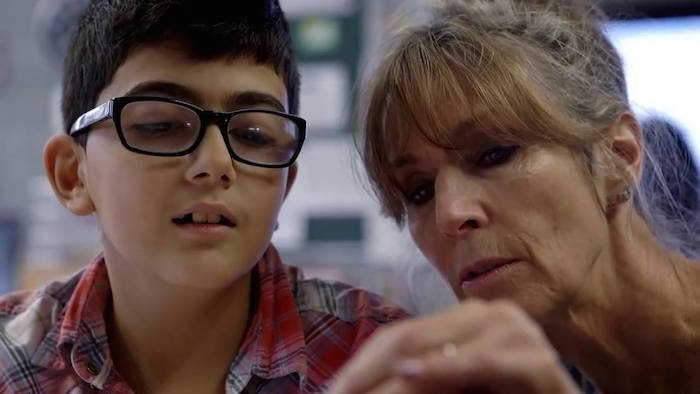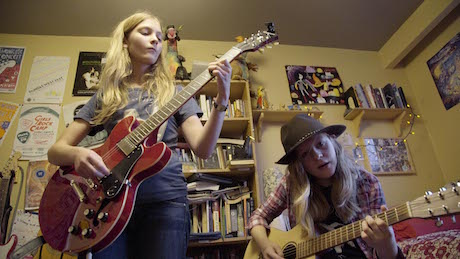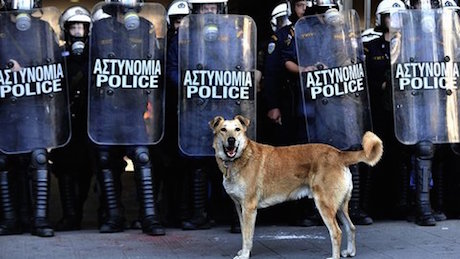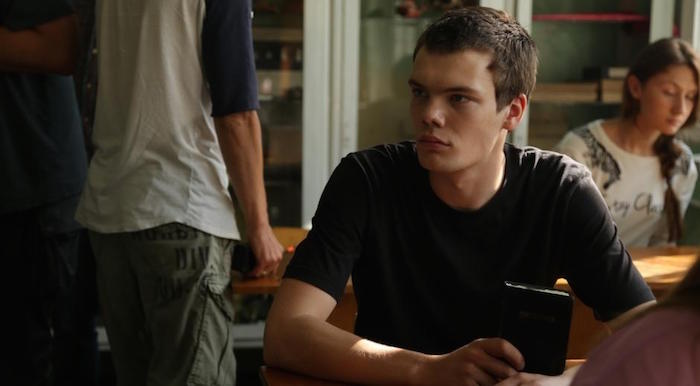FIVE FAVOURITES FROM MELBOURNE'S FESTIVAL OF FACTUAL FILM
 Saturday, July 8, 2017 at 7:22AM
Saturday, July 8, 2017 at 7:22AM MELBOURNE DOCUMENTARY FILM FESTIVAL: Festival Director Lyndon Stone and his programming team have collated a catalogue of factual films that have wowed audiences at the planet’s most prestigious 2017 documentary showcases. SCREEN-SPACE got a peek at this year’s line-up and offers our opinion of five films that deserve attention, discussion and sold-out auditoriums. Each is a unique vision, certain to engage, infuriate, inspire and enlighten, as all good documentaries should…

MISS KIET’S CHILDREN (Dirs. Peter Lataster, Petra Lataster-Czish; The Netherlands, 115 mins; pictured, above)
A Dutch school marm exhibits a warrior’s spirit, a saint’s heart and...well, a great teacher's patience in this understated yet soaring study of what the term ‘assimilation’ means to a classroom in Holland. Refugee children, each displaying resilience and depth of character beyond their years, are captured with an extraordinary intimacy by the lens of husband/wife filmmakers Peter Lataster and Petra Lataster-Czish. The politics of age and gender are glimpsed in the kids’ behaviour; most profoundly, the impact of the conflict they have fled is slowly expos ed by the filmmaker’s sublime technique. When awkward pre-teen Jorg reveals why he might be less studious than is expected of him, have the tissues ready.
Rating: 4/5
MDFF Screening: July 13 @ 6.30pm.
PLAY YOUR GENDER (Dir: Stephanie Clattenburg; U.S.A.; 80 mins.) While the gender divide within the American film industry has made headlines of late, little mention has been made of the fact that only 5% of the producers working the panels in the music industry are women, or that only 20% of published songs are by women lyricists. Canadian singer-songwriter Kinnie Starr and first-time director Stephanie Clattenberg pair up to pile revelation upon revelation in this blood-boiling expose of the music sector’s traditional gender bias and ‘glass ceiling’ mindset. That such a film needs to exist in this day and age is outrage enough; that it runs rich with passionate, talented, intelligent woman who have seen their careers hindered by sexism and misogyny demands action. Features such groundbreaking artists as ‘Hole’ bassist Melissa Auf der Maur and drummer Patty Schemel; Sara Quin of ‘Tegan and Sara’; and, ‘The Stolen Minks’ frontwoman Stephanie Johns.
While the gender divide within the American film industry has made headlines of late, little mention has been made of the fact that only 5% of the producers working the panels in the music industry are women, or that only 20% of published songs are by women lyricists. Canadian singer-songwriter Kinnie Starr and first-time director Stephanie Clattenberg pair up to pile revelation upon revelation in this blood-boiling expose of the music sector’s traditional gender bias and ‘glass ceiling’ mindset. That such a film needs to exist in this day and age is outrage enough; that it runs rich with passionate, talented, intelligent woman who have seen their careers hindered by sexism and misogyny demands action. Features such groundbreaking artists as ‘Hole’ bassist Melissa Auf der Maur and drummer Patty Schemel; Sara Quin of ‘Tegan and Sara’; and, ‘The Stolen Minks’ frontwoman Stephanie Johns.
Rating: 4/5
MDFF Screening: July 9 @ 1.45pm.
THE ROAD MOVIE (Dir: Dmitrii Kalishnikov; Belarus; 67mins)
The dashcam phenomena has swept Russia and its territories; insurance scams, police misbehaviour and road rage incidents has led to almost every car being fitted with a windscreen lens. So director Dmitrii Kalishnikov had a lot of footage to work with when he conceptualised a vision of modern Russian life as captured by the population itself. Of course, he indulges in the extraordinary – truck crashes, speedsters on snowy roads, cows being hit (they walk away, incredibly) and the ‘comet footage’ that went viral. But The Road Movie is at its most compelling when it focuses on the voices of the unseen within the vehicle. Waves of emotion emerge in an instant; moments of terror, exhilaration, hilarity, even first love unite in a flowing cinematic essay. In the hands of a skilled filmmaker, Russia’s favourite dashboard gadget has delivered a forceful social experience.
Rating: 4.5/5
MDFF Screening: July 9 @ 9.30pm.
ELLA BRENNAN: COMMANDING THE TABLE (Dir: Leslie Iwerks; U.S.A.; 96 mins.) She is La grande dame of the American restaurant landscape, the matriarch of a New Orleans culinary clan that has shaped the nation’s cuisine for a century. Ella Brennan makes for a mighty cinematic figure, her iron-willed charisma ideally suited for Leslie Iwerks’ boisterous celebration of spirit, showmanship and determination. Occasionally it teeters on hagiography; viewers aren’t left wondering what a wonderful time is to be had at Brennan’s legendary Big Easy establishment, Commander’s Palace. It’s a minor complaint; one can’t begrudge the party atmosphere Commanding The Table captures and the extraordinary legacy Ella and her clan have forged.
She is La grande dame of the American restaurant landscape, the matriarch of a New Orleans culinary clan that has shaped the nation’s cuisine for a century. Ella Brennan makes for a mighty cinematic figure, her iron-willed charisma ideally suited for Leslie Iwerks’ boisterous celebration of spirit, showmanship and determination. Occasionally it teeters on hagiography; viewers aren’t left wondering what a wonderful time is to be had at Brennan’s legendary Big Easy establishment, Commander’s Palace. It’s a minor complaint; one can’t begrudge the party atmosphere Commanding The Table captures and the extraordinary legacy Ella and her clan have forged.
Rating: 3.5/5
MDFF Screening: July 12 @ 6.00pm.
DOGS OF DEMOCRACY (Dir. Mary Zournazi; Australia/Greece; 58 mins.) They have become the spiritual symbol of modern Athens, guardians of the streets who exist with dignity intact and the acceptance of the population. First-time director Mary Zournazi captures the stray dogs of the Greek capital with a deeply respectful and compassionate lens, acknowledging the hope they represent to a people who themselves are often portrayed as the ‘stray dogs of the EU’. Most affectionately, Zournazi relates the legend of Loukanikos, a magnificent beast who would fearlessly lead those protesting the government’s austerity measures against riot squad heavy-handedness.
They have become the spiritual symbol of modern Athens, guardians of the streets who exist with dignity intact and the acceptance of the population. First-time director Mary Zournazi captures the stray dogs of the Greek capital with a deeply respectful and compassionate lens, acknowledging the hope they represent to a people who themselves are often portrayed as the ‘stray dogs of the EU’. Most affectionately, Zournazi relates the legend of Loukanikos, a magnificent beast who would fearlessly lead those protesting the government’s austerity measures against riot squad heavy-handedness.
Rating: 3.5/5
MDFF Screening: July 16 @ 9.30am.
(SCREEN-SPACE Managing Editor Simon Foster is a judge at the 2017 MDFF and will be a guest of the festival)
The 2017 MELBOURNE DOCUMENTARY FILM FESTIVAL screens from July 9-16. Session, venue and ticketing information can be found at the events official website.



